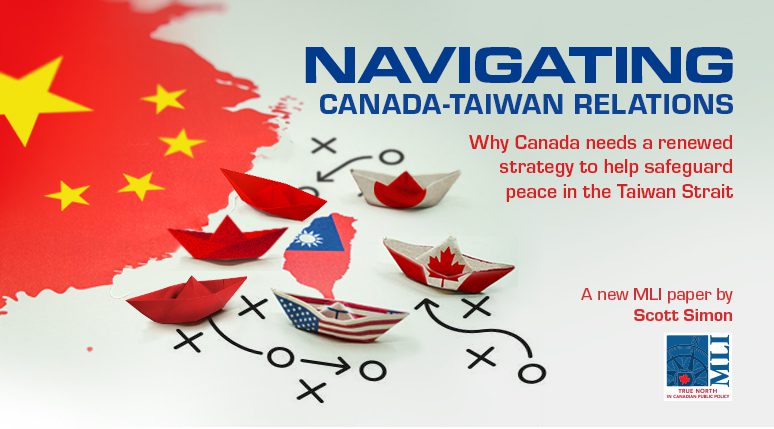OTTAWA, ON (October 12, 2022): This year has seen a remarkable resurgence of authoritarian aggression globally. Among the many challenges, China’s escalating hostility toward Taiwan poses significant risks to the international order.
How can Canada ensure that peace is maintained across the Taiwan Strait? What can we do to successfully support our democratic ally as it faces Beijing’s belligerence? A new paper by MLI Senior Fellow Scott Simon, titled Navigating Canada-Taiwan relations: Why Canada needs a renewed strategy to help safeguard peace in the Taiwan Strait, sets about answering these questions and more.
“The Canada-Taiwan relationship has never been merely a subset of Canada-China relations,” writes Simon. “Canada has asserted to this day that peace and security in the Taiwan Strait is an international issue rather than, as Beijing would prefer to frame it, an internal Chinese affair that brooks no foreign intervention.”
In the paper, Simon explores the diplomatic history of Canada-Taiwan relations both independently of and in tandem with Canada-China relations. He contrasts this history against contemporary Canada-Taiwan relations, finding that despite major changes to Taiwan’s polity, economy, and cross-strait relations, “Taiwan only started to regain prominence in Canadian policy circles after 2018.”
The paper also corrects many major misconceptions regarding the Canada-Taiwan relationship. For instance, contrary to Beijing’s modern narratives, Taiwan has always been historically understood by Canada as being a politically distinct entity from China. Moreover, Canada’s “One China Policy” (like most other countries’ policies) does not recognize Beijing’s claims to Taiwan, merely taking note of China’s position on the matter, neither challenging nor endorsing that position.
Given that China’s framing on the matter is deliberately deceptive and Beijing’s increasing intransigence threatens the peace and stability of the region, Simon argues that Canada must pursue a new strategy. Among the recommendations offered in the paper, some key ones include:
- Re-asserting that diplomatic, trade, and other normal relations with Taiwan will not be disrupted by China’s coercion;
- Pursuing both official and unofficial means to hold direct discussions with Taiwanese officials and other regional partners;
- Considering the formalization of elements of the Canada-Taiwan relationship in Canadian legislation;
- Enhancing the role of Parliament, potentially following the example of Japan with party-to-party security dialogues with Taiwan;
- Supporting Taiwan’s accession to the Comprehensive Progressive Agreement for Trans-Pacific Partnership;
- Collaborating on joint initiatives with Taiwan’s formal diplomatic partners, including with economic development and disaster relief in Haiti and Oceania, to support the maintenance of these relations; and
- Preparing for potential contingencies, such as increasing Canada’s military presence in the Indo-Pacific and considering the formal diplomatic recognition of Taiwan to deter China’s aggression.
As Simon argues, “a renewed Taiwan strategy as part of a larger Indo-Pacific plan is necessary to maintain the peace and prosperity that we have enjoyed for the past seven decades and hope to bequeath to future generations.”
To learn more, read the full paper here:
***
Scott Simon, Senior Fellow at the Macdonald-Laurier Institute, is a Professor of sociology and anthropology at the University of Ottawa where he holds the Research Chair of Taiwan Studies.
For more information, media are invited to contact:
Skander Belouizdad
Communications Officer
613-482-8327 ext. 111
skander.belouizdad@macdonaldlaurier.ca







